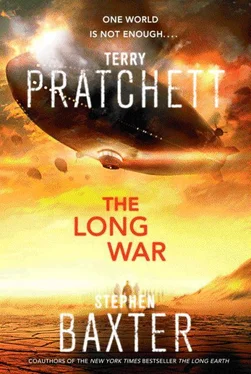Terry Pratchett - The Long War
Здесь есть возможность читать онлайн «Terry Pratchett - The Long War» весь текст электронной книги совершенно бесплатно (целиком полную версию без сокращений). В некоторых случаях можно слушать аудио, скачать через торрент в формате fb2 и присутствует краткое содержание. Год выпуска: 2013, ISBN: 2013, Издательство: Harper, Жанр: Фантастика и фэнтези, на английском языке. Описание произведения, (предисловие) а так же отзывы посетителей доступны на портале библиотеки ЛибКат.
- Название:The Long War
- Автор:
- Издательство:Harper
- Жанр:
- Год:2013
- ISBN:978-0-06-206777-7
- Рейтинг книги:4 / 5. Голосов: 1
-
Избранное:Добавить в избранное
- Отзывы:
-
Ваша оценка:
- 80
- 1
- 2
- 3
- 4
- 5
The Long War: краткое содержание, описание и аннотация
Предлагаем к чтению аннотацию, описание, краткое содержание или предисловие (зависит от того, что написал сам автор книги «The Long War»). Если вы не нашли необходимую информацию о книге — напишите в комментариях, мы постараемся отыскать её.
The Long War — читать онлайн бесплатно полную книгу (весь текст) целиком
Ниже представлен текст книги, разбитый по страницам. Система сохранения места последней прочитанной страницы, позволяет с удобством читать онлайн бесплатно книгу «The Long War», без необходимости каждый раз заново искать на чём Вы остановились. Поставьте закладку, и сможете в любой момент перейти на страницу, на которой закончили чтение.
Интервал:
Закладка:
Bandwidth here was generally dreadful, but not for Nelson. A man with a past like his—he’d once worked for the Black Corporation itself, if only indirectly—had a great many contacts in many useful places: favour speaks unto favour. Only last year a black helicopter had landed just short of the graveyard and the team of technicians that stepped out on to the glebe had left him with access to as much satellite traffic as he wanted—including some channels known to very few people indeed—and moreover the means to decipher those channels.
When he’d done with the latest soc-media chit-chat, he left his study for the kitchen. A search like the one he’d just initiated was never going to be quick, and, while his software agents were scuttling across the web, he warmed up a microwave curry.
And he reflected, as he often did, about the previous inhabitants of this parsonage. The equipment in his study—his phone, laptop, tablets—was all state of the art, more or less, though it would mostly have been familiar to a user of ten or twenty years ago. This was an argument seized on by some critics of the Long Earth migration. Need exerted a necessary pressure on humanity: you had to be hungry to innovate, and you needed to be surrounded by competitors to be driven to achieve. And in the Long Earth, with bellies filled too easily and plenty of space to spread out into, invention had stalled. Still, none of Nelson’s predecessors here, not even the most recent, had had access to anything like the technology at his fingertips now, retro or not.
And every single one of them had been unable, just like Nelson, to make the antique toilet work properly. He liked that reflection; it helped keep him down to earth.
The cooking done, he returned to his study—the Lobsang search was still in progress—and as he ate he logged into the Quizmasters.
This was a little-known chat room, access to which would only be vouchsafed to you by invitation—and the invitation was a series of tests. Nelson, intrigued by a quiz he’d been sent without explanation, had completed it after evensong one day a few weeks ago. It took him twenty-seven minutes. His reward was to be sent another quiz, of similarly fiendish intricacy. Over the following days more quizzes turned up randomly. Nelson had been impressed by the questions, which demanded not only knowledge in a vast number of fields but also the ability to make use of that knowledge against the clock, while drawing on a multiplicity of disciplines, including un -disciplines… In the nerdosphere, in pursuit of the elusive and the strange, the strongest intellect, Nelson knew, was good for nothing without a propensity for pack-rat fact accumulation, an appreciation of serendipity, and an endless interest in the incongruous, the out of place. And that was what the Quizmasters’ tests seemed to select for.
The room had opened for him on the seventh day. That was the first time he’d learned the group’s name for itself. Initially the Quizmasters seemed like any other chat room, except that everybody in it knew that in some way they had been chosen , which gave a frisson to the proceedings. A self-selecting elite of the nerdosphere—and very useful, he’d found, if directed to a task.
But time and again conversations in that room came round to the monopoly known as the Black Corporation, which was for the most part detested by the circle members. That itself being a puzzle, of course.
When Nelson went online, or, more accurately, on lines , he mixed in cyberspace with a lot of people who had a marked dislike of black helicopters, governments, washing more than once a week, and above all, secrets —and, just to top it off, particularly didn’t like the Black Corporation. Which was kind of strange if you thought about it, since the infrastructure of the nerdosphere itself nowadays was more or less supported by Black products. Certainly the nerdosphere was always full of speculation, scuttlebutt and downright lies about what was happening in the most ultra-secret laboratories of the organization.
Yes, everybody knew Black’s story, the elements of which had become as familiar, it sometimes seemed to Nelson, as the Nativity. It was a classic American narrative of its kind. It had all started when Douglas Black and his associates had set up “just another computer company’, with the help of Black’s late grandfather’s oil-money bequest. This was the early 1990s; Black had only been in his mid-twenties. From the beginning Black’s lines had included such much-longed-for-by-customers products as computers with long battery power and fault-free software, machines that were your partners, not just a gadget for extracting money from you, not just an ad for some superior future version of themselves. Machines that seemed mature. And from the beginning Black had begun to make philanthropic donations of various kinds around the world, including a scholarship programme in South Africa that Nelson himself had benefited from.
With time the Black product line went from strength to strength, and began to innovate significantly. Black was entitled to rewards aplenty for his intellectual courage, as far as Nelson was concerned. He was after all the founder of the first “serendipital laboratory’. The logic was that since so many important new discoveries in science were made by accident, then the process would be speeded up if you set up a situation in which a very large number of accidents happened, and watched the results carefully. According to legend Black had even deliberately employed people who didn’t quite know what they were doing, or had a bad memory, or who were known to be congenitally unlucky and careless. It was, of course, a lunatic idea. Black did take some precautions, such as building his laboratory to the same safety standards as were employed by explosives manufacturers…
Black’s innovations had won him huge sales, public praise, and a concerted attack by instant enemies. The established companies he was wrong-footing, and whose profits he was trashing, accused him of everything from monopolistic practices to a lack of patriotism. The public didn’t buy any of these lies, it seemed, but it did keep on buying Black’s neat stuff. And indeed the public bought into Black himself, who became a hero, a cheerful rogue thumbing his nose at older, lumbering companies, investing in spectacular super-rich indulgences like homes under the sea and jaunts into orbit, while sprinkling charities and good causes with staggering amounts of money.
Then the gods truly smiled on Black’s project when an experiment to find a new type of surgical plaster was left too long in the sunshine and turned into “gel’, as it became known, a curious quasi-organic matter embedded with self-designing, self-repairing bio-neural circuitry, smart enough to morph itself physically to fit the circumstances it found itself in. The newspapers called it the intelligent bandage , after its first applications, but it had soon proved to be much more than that—and much smarter. As a self-correcting, self-repairing, physically malleable data and processing store, gel in all its forms had become the mainstay of the Black Corporation’s output. There was a wave of new products, and indeed new types of product. This time many of Black’s competitors were wiped out completely.
Now it was the turn of governments to become suspicious. Black was simply too rich, too powerful—not to mention too generous and too popular—to be borne. The US administration made attempts to take control of Black’s operations under various national-interest fig-leaves, or at least to break up his empire. Eminent domain was quoted; militarization of Black’s enterprises was attempted.
But Black hastily diversified into obviously non-security, non-military applications, such as medicine. Suddenly the corporation turned its attention to the disadvantaged: to letting the dumb speak and the lame walk. Nowadays there were people seeing, hearing, walking, running, swimming, even juggling, thanks to the prosthetic aids, implants, and other products developed by the Black Corporation and its subsidiaries. With such a portfolio behind him Black was able to argue that there was no national interest served in the government’s pursuit of him; its actions were anti-capitalist—whisper it quietly, socialist .
Читать дальшеИнтервал:
Закладка:
Похожие книги на «The Long War»
Представляем Вашему вниманию похожие книги на «The Long War» списком для выбора. Мы отобрали схожую по названию и смыслу литературу в надежде предоставить читателям больше вариантов отыскать новые, интересные, ещё непрочитанные произведения.
Обсуждение, отзывы о книге «The Long War» и просто собственные мнения читателей. Оставьте ваши комментарии, напишите, что Вы думаете о произведении, его смысле или главных героях. Укажите что конкретно понравилось, а что нет, и почему Вы так считаете.











